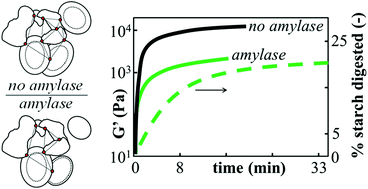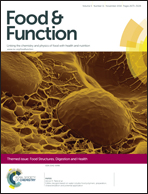Influence of hydration and starch digestion on the transient rheology of an aqueous suspension of comminuted potato snack food
Abstract
Oral processing of most foods is inherently destructive: solids are broken into particles before reassembly into a hydrated bolus while salivary enzymes degrade food components. In order to investigate the underlying physics driving changes during oral processing, we capture the transient rheological behaviour of a simulated potato chip bolus during hydration by a buffer with or without α-amylase. In the absence of amylase and for all oil contents and solids weight fractions tested, we find a collapse of the transient data when graphed according to simple Fickian diffusion. In the presence of amylase, we find effects on the transient and pseudo steady state bolus rheology. Within the first minute of mixing, the amylase degrades only ≈6% of the starch but that leads to an order of magnitude reduction in the bolus elasticity, as compared to the case without amylase. Thus, for an in vitro bolus, only a small amount of starch needs to be digested to have a large impact on the bolus rheology very soon after mixing.

- This article is part of the themed collection: Food Structures, Digestion and Health International Conference

 Please wait while we load your content...
Please wait while we load your content...